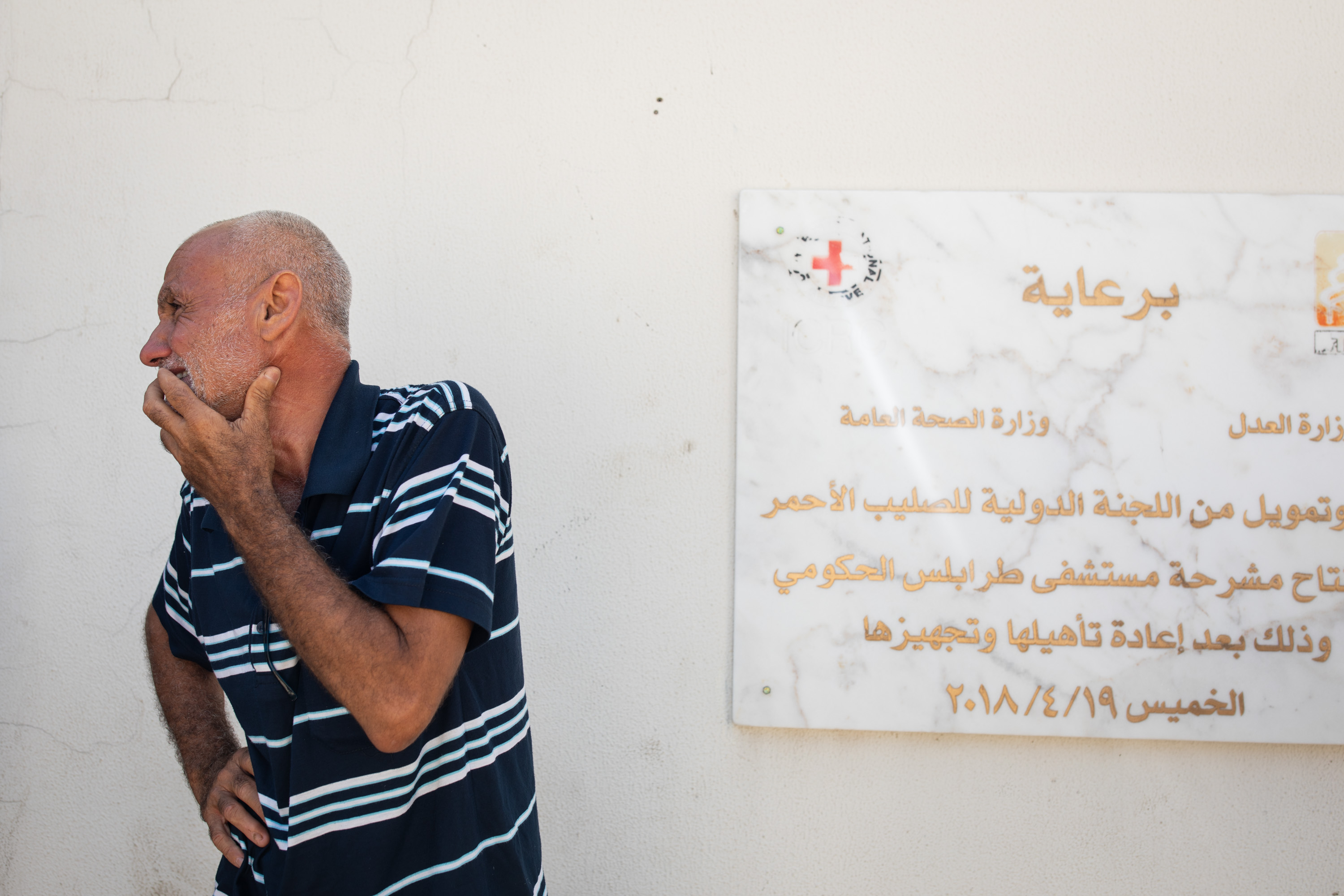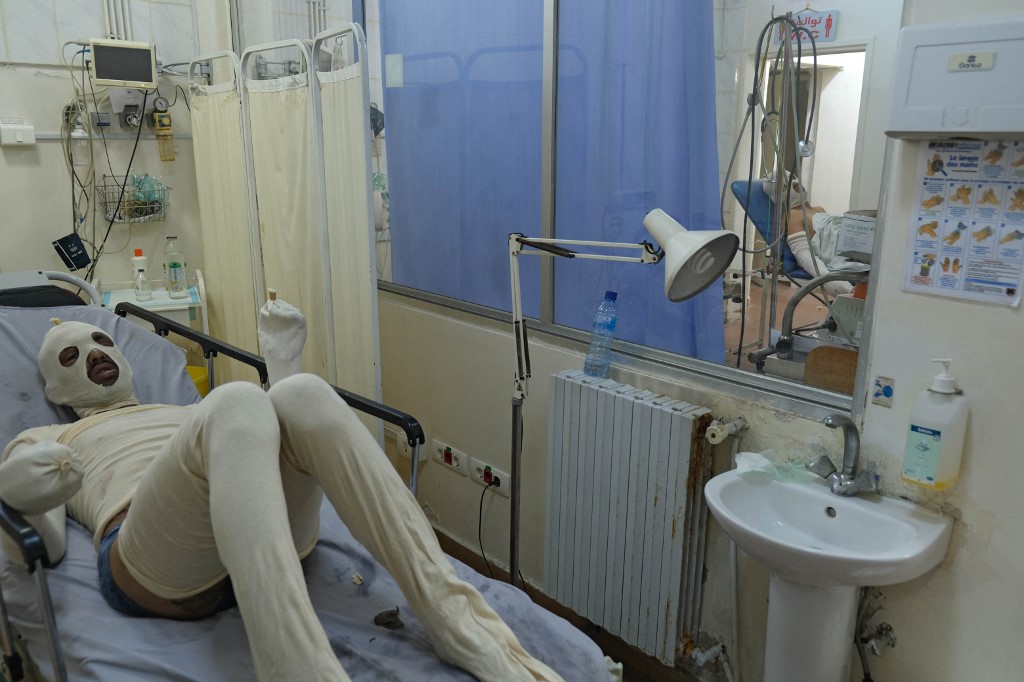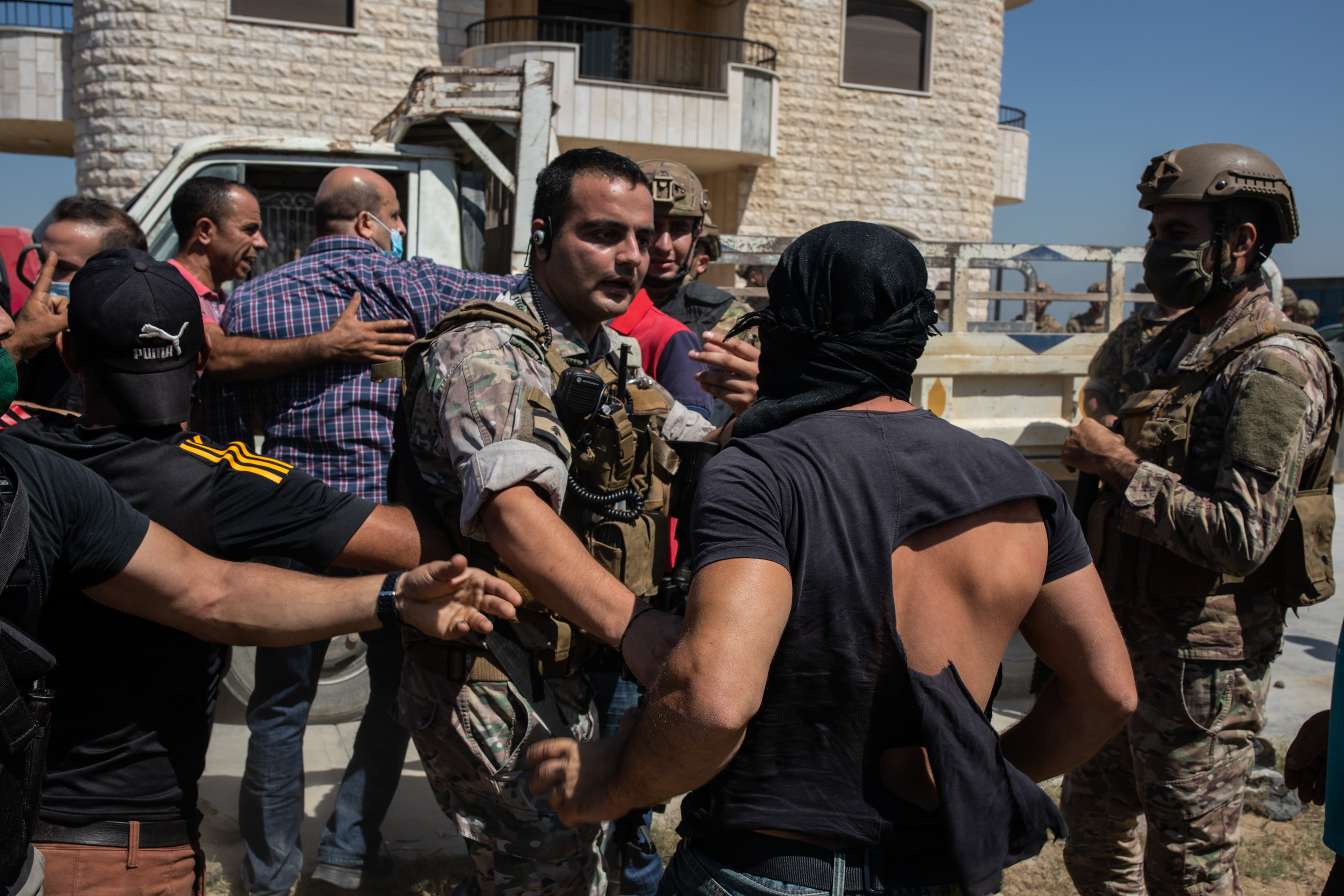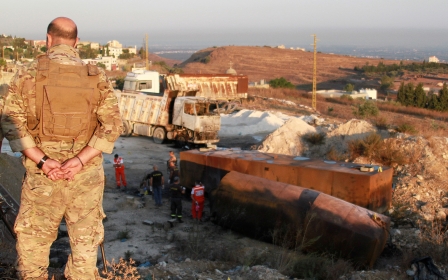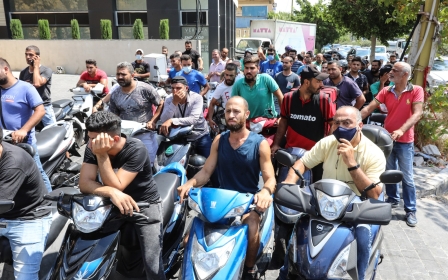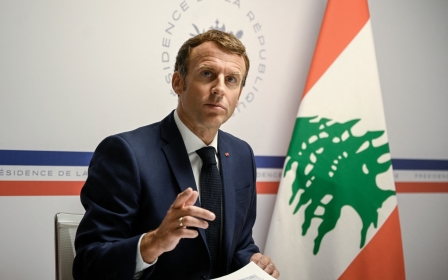Lebanon: Explosion of 'secret tanker' storing fuel leaves dozens dead
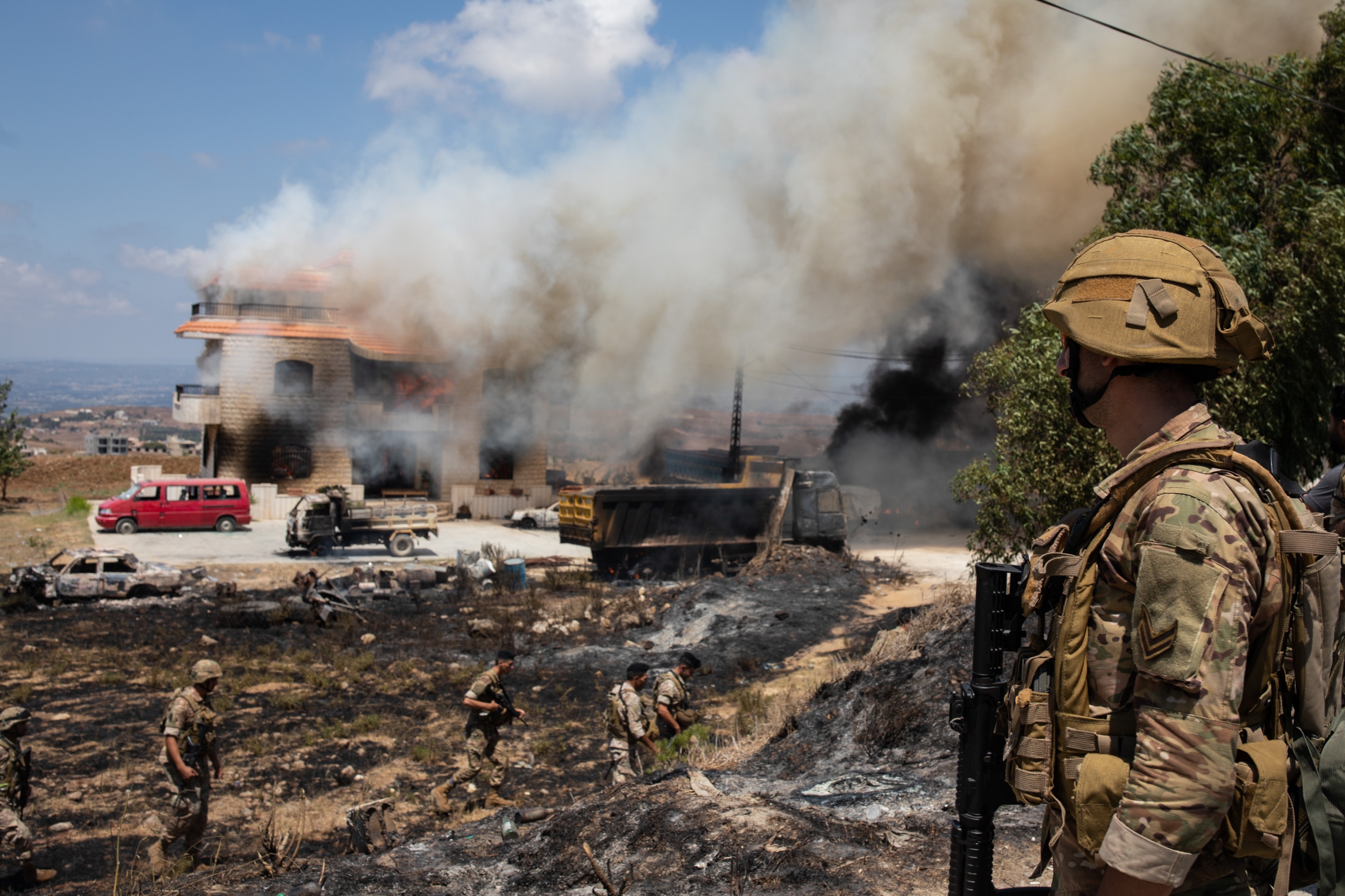
Ismail Hasan collapsed against the wall of the morgue after learning that two of his sons were killed by a fuel tanker blast in the early hours of Sunday morning.
The doctors and army soldiers at the Government Hospital of Tripoli in Lebanon could do little to comfort him as the afternoon sun beat down on the small building beside the hospital.
At least 28 people were killed and 79 injured when a tank containing 60,000 litres of gasoline exploded in the northern Lebanese region of Akkar just before 2am on Sunday morning.
Officials said a resident of the village of Tleil had been secretly hiding the fuel before being discovered by the army. After confiscating 80 percent of the fuel, the army then began to distribute the rest amongst the people gathered.
'The wives of my two boys who died are pregnant'
- Ismail Hasan, father of two victims
The source of the explosion remains unknown, but local eyewitnesses described a fight breaking out amongst the 200-person strong crowd gathered.
New MEE newsletter: Jerusalem Dispatch
Sign up to get the latest insights and analysis on Israel-Palestine, alongside Turkey Unpacked and other MEE newsletters
This led to gunshots being fired which ignited the fuel.
Eyewitnesses have said it was the son of the man who stored the fuel tanker who fired the shots, but this could not be confirmed. Other accounts have cited the cause as a lighter being used near the fuel as the fight broke out.
The Lebanese Army released a statement saying the son of the owner of the house where the secret tanker was kept had been arrested.
Ismail Hasan was still in tears as the army doctors at Tripoli’s Governmental Hospital ushered him away for a DNA test.
Of the seven bodies brought to the hospital so far, only four had been identified. One of those was Hasan’s son Ahmed and a DNA test was needed before the identification could be confirmed.
“The wives of my two boys who died are pregnant,” Hasan told Middle East Eye between sobs, before making his way across the city to identify his son Mohammed at another hospital.
Hasan said his two sons, 29-year-old Mohammed and 31-year-old Ahmed, did not even own cars and that they had just stopped by to see what was happening.
The Lebanese Red Cross told MEE that they had treated over 79 injuries at the scene, with 15 of the most critical cases being taken out of Lebanon. The search for bodies and limbs continued until 7.30am before being called off.
Bodies burnt black
The Salam Hospital in Tripoli, which specialises in burns, had been receiving victims of the blast all morning. For one man, Salam was the fifth hospital he had visited while searching for his cousin.
Twenty minutes away at Youssef Hospital in Halba, Doctor Basam, who would only give his first name, told MEE that two victims had died at the hospital that morning and that three soldiers had been brought in.
At the Government Hospital in Halba, five families came to identify their loved ones who died in the blast but were unable to distinguish the victims from one another due to the severity of the burns.
One hospital worker described those that were brought in as bodies burnt black. One of those who died was eventually identified by a ring he was wearing.
Later that morning angry friends and relatives of the victims of the blast descended on the home of the person who allegedly kept the secret tanker in an attempt to break in. They smashed windows and set fire to the cars parked outside in a show of rage.
One man eventually prised open a ground floor window and lit a fire on the ground floor which quickly spread throughout the house. The homeowner and his family had long since fled their home.
The army arrived to push the crowd back as the flames engulfed the house and clashes ensued. As the fire spread from one car to another, both the army and the relatives of the victims sought safety away from the house on the road overlooking it.
The crowd gathered was then moved further down the road by the army as memories of the earlier explosion were still fresh in the soldiers’ minds.
“We are angry. More than twenty people have died,” Majid Hammoud, a resident of the neighbouring town of Halba, told Middle East Eye. “It was a big explosion, and we have a big problem in Lebanon. No medicine, no gas and no money.”
This morning’s events come only days after Riad Salameh, the governor of Lebanon’s central bank, decided to lift subsidies on fuel on Wednesday. This prompted panic buying across the country.
The army was deployed to petrol stations as fuel reserves ran dangerously low and people scrambled to fill their cars. Fights have broken out and gunshots have been fired at petrol stations as people have been forced to queue for hours on end in the relentless August sun.
Caretaker prime minister, Hasan Diab, described Salameh’s decision as against the law and that “it does not take into account the reality of the deep living and social crisis.”
Echo of the Beirut blast
The blast in Akkar was a smaller echo of the one being commemorated two weeks ago in Beirut - when 2750 tonnes of improperly stored ammonium nitrate caught fire and exploded, killing 218 people – but can be seen as part of the wider Lebanese malaise.
Over half the population live below the poverty line and subsidies on fuel, food and medicine have been slowly running out.
With government electricity being reduced to a few hours a day, residents of Lebanon have been forced to rely on generators and fuel sold on the black market. However, the means to power these generators is now in short supply.
'We have one big mafia here ...They want everything and there is nothing for the people'
- Mohammed Aechan,
Tleil resident
The American University of Beirut Medical Centre, one of the region’s top hospitals, released a statement on Saturday saying that it was running out of fuel for its generators.
It went on to stress that if no fuel was secured by Monday, it would be forced to turn off the respirators of 40 adults and 15 children, killing them "immediately".
Ex-prime minister Saad Hariri, took to Twitter after learning of the explosion in Akkar to demand the resignation of the president, Michel Aoun.
The fuel shortages have hit the northern area of Akkar particularly hard, with many petrol stations running out of fuel long before those in the capital of Beirut. Black market sellers have been forced to fill water bottles with fuel and sell what they can on the side of the road.
Today one such seller was asking for 250,000 Lebanese pounds for 10 litres, the equivalent of $167 at the central bank’s official exchange rate of 1500 Lebanese pounds to the dollar.
Trucks heading to the northern border with Syria and believed to be containing fuel have been stopped by angry groups in Akkar and seized in protest.
“There is no gas for the bread ovens,” Majid Hammoud told MEE.
Lebanon has been described as a failed state and those still living here have long since lost hope in the political class governing the country.
Lebanon’s chaotic descent is quickly gaining momentum and Mohammed Aechan, a resident of Tleil, summed up the feelings of those who had come to exact their revenge on the home of the man with the secret tanker, and of many of those still living in Lebanon:
"We have one big mafia here. From the president to the minister of health, to the minister of energy," Aechan said. "They want everything and there is nothing for the people."
Middle East Eye delivers independent and unrivalled coverage and analysis of the Middle East, North Africa and beyond. To learn more about republishing this content and the associated fees, please fill out this form. More about MEE can be found here.


